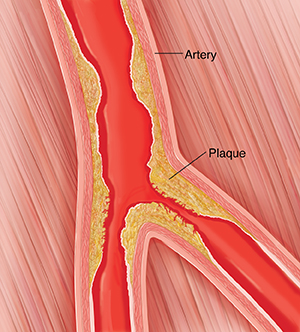High Cholesterol and Peripheral Arterial Disease (PAD)
Cholesterol is a fatty substance that builds up in your bloodstream. High cholesterol can harm your arteries. That raises your risk for peripheral arterial disease (PAD). This disease affects arteries in the legs. If you have PAD, it’s likely that arteries in other parts of your body are diseased too. That puts you at high risk for a heart attack, other heart diseases, and stroke. Read on to learn how high cholesterol can lead to PAD and affect your health.
What is cholesterol?
Your total cholesterol can be measured by a blood test. There are 2 kinds of cholesterol:
-
LDL (low-density lipoprotein) is called "bad" cholesterol. It's a particle that carries cholesterol in the bloodstream and puts it in artery walls.
-
HDL (high-density lipoprotein) is called "good" cholesterol. It's a particle that picks up extra cholesterol from artery walls.
How can high cholesterol lead to PAD?
Having high cholesterol (or a high LDL level) promotes plaque buildup in your arteries. Plaque is a waxy material made up of cholesterol and other things. When you have too much plaque, your arteries can become narrowed and limit blood flow. Having a high level of fat in your blood (triglycerides) also raises your risk for blocked arteries.
If high cholesterol isn’t controlled, you're more likely to have PAD and other blood vessel problems. But high cholesterol can be managed with diet changes, exercise, and medicine.

What happens if high cholesterol isn’t controlled?
-
High LDL and triglyceride levels put you at greater risk for heart attack, stroke, and PAD that gets worse.
-
Even if your LDL is normal, a low HDL puts you at risk for all types of vascular disease.
What happens if high cholesterol is controlled?
-
Lowering LDL reduces your risk for heart attack, stroke, heart or artery surgery, and PAD that gets worse.
-
Raising HDL may also help lower these risks.
Online Medical Reviewer:
Marianne Fraser MSN RN
Online Medical Reviewer:
Stacey Wojcik MBA BSN RN
Date Last Reviewed:
2/1/2025
© 2000-2025 The StayWell Company, LLC. All rights reserved. This information is not intended as a substitute for professional medical care. Always follow your healthcare professional's instructions.